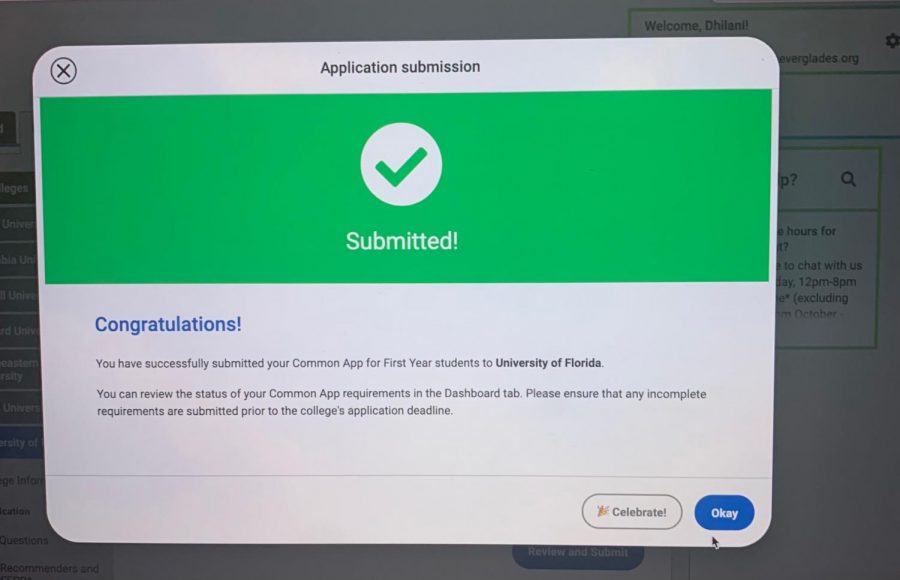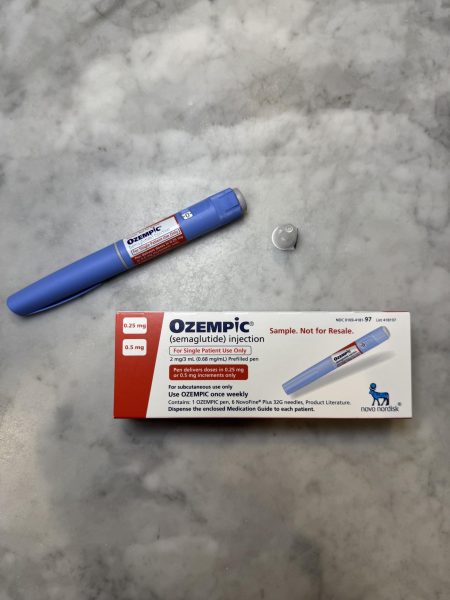Is Test-Optional Really Test-Optional?
Many students support college admissions moving beyond the SAT and ACT—but some remain skeptical
A cathartic screen.
In November, seniors in the Class of 2022 clicked “submit” on their early applications, taking part in what has become a nerve-wracking annual tradition. But the college admissions process has undergone dramatic changes in the past few years, especially as the pandemic has forced colleges to shift to test-optional policies. Colleges now place more focus on students’ GPA, coursework, and character in the classroom, a shift that has dramatically affected the approaches and prospects of recent alumni and seniors. For the most part, RE college counselors, alumni, and students have expressed their support for the new era of test-optional applications—but seniors still feel obligated to submit test scores, raising the question of whether tests have truly become “optional” in practice.
Before the COVID-19 pandemic, colleges required all applicants to submit scores on either the SAT or ACT. These scores played an important role in determining a student’s academic caliber. As the world started to close and testing centers shut down, students were unable to take the required tests, and colleges were forced to go temporarily test-optional, giving students the option to choose whether they wanted to submit scores. Colleges began to assert that they would evaluate each student’s application not based on what is missing but based on what is there. That is, if students decided not to submit test scores, they would not be at a disadvantage compared to those who did decide to submit them.
But even as the world has started to open up more, colleges have stuck to test-optional for the 2021-2022 application season, suggesting that the policies are part of a larger cultural shift away from the emphasis on test scores. Former Director of College Counseling at RE Mr. Lew Stival adheres to a widely held belief that de-emphasizing test scores is a response to the SAT and ACT being unfair.
“The opportunity to attend a good school, the opportunity to be taught by good teachers, the opportunity to have the resources to get test prep, and the opportunity to travel and have the ability to augment your education” play a significant role in determining how well a student performs on standardized tests aside from pure intelligence, Mr. Stival said. “There are lots of people in this country who don’t have those opportunities,” he went on, noting that in other areas of the country where students may not have had every advantage in education, “there could be a wider range of scores.”
From Mr. Stival’s perspective, coming from a high school that offers extensive opportunities, RE students are automatically placed at an advantage with their ability to take high-level, advanced classes that give them the skills necessary to score well on standardized tests. Furthermore, many students at RE have the resources to seek private SAT and ACT tutors who can help train them to become better test-takers—an opportunity that helps explain why, to many critics, standardized testing is not truly ‘standardized.’
Several RE students and alumni echoed Mr. Stival’s view that test-optional is a way for colleges to acknowledge the unfair advantages students of wealthier and more educationally privileged backgrounds possess. “Standardized testing is anything but standardized because of the unequal opportunities for people who can’t afford to be privately tutored. So I am for test-optional,” said Elanah Arnold ’21, a recent alumna who went through the test-optional application process.
Mr. Stival also defended test-optional because “it gives kids more flexibility and freedom.” He thinks that de-emphasizing the importance of test scores allows the “rigor of the high school” to come to the forefront. “Coming out of a really strong high school is only a plus in the college process,” he said, so taking the focus off of testing allows course rigor and performance in classes to become more important in an admissions officer’s evaluation of a student.
For other members of the RE community, test-optional has generated some criticism. Senior Lauren Zanarini ’22 expressed the belief that “some sort of standardized measure [should be] placed upon all applicants because that’s a way for students coming from all different places…to be evaluated upon some sort of common ground.” When it comes to the SAT and ACT, however, Zanarini feels that these tests fail to achieve this goal. “I don’t think that the standardized testing that we take are good measures of what somebody has to offer as a student,” Zanarini explained. She explained that they do not accurately reflect a student’s overall package and fail to test many of the academic skills that should be considered for admission to selective colleges.
Mr. Stival disagreed with the idea of having a different standardized measure to evaluate applicants in the admissions process because of the inequity in course rigor and access to test prep resources that would come with preparing for any standardized exam. To Mr. Stival, earning straight-As in math classes, getting great letters of recommendation from math teachers, and working very hard to excel in school already says a great deal about an applicant. “That information actually is probably a lot more helpful than a 740 on an SAT math section,” Mr. Stival explained. He said that it is difficult for him to believe that admissions officers will need a standardized test score to validate what they already know about an applicant through other facets of their application. “There are plenty of clues in every kid’s application to suggest that without the testing, the kid can do the work.”
A March 19, 2021 “This American Life” podcast episode titled “The Campus Tour Has Been Cancelled,” hosted by Ira Glass, highlights Mr. Stival’s point. Glass interviewed a senior named Lorraine who faced the college admissions process in the heart of the pandemic. While Lorraine was a student with a high GPA, her SAT scores fell under the typical score range of the top schools she aspired to attend. So, as colleges shifted towards test-optional, Lorraine saw a new door of opportunity open as she realized that she truly had a chance to get into her dream school.
Lorraine was not the only person to find this door of opportunity, however; top schools throughout the country began to receive thousands more applications because students whose test scores fell short of the typical score ranges finally had the chance to showcase their worth. According to the podcast, “NYU applications were up 20%, Cornell’s up 31%, Columbia up 51%.” Test-optional gave more students across the country, with fewer opportunities, a chance to chase their dreams.
But is test-optional really test optional? Admissions data from colleges for the class of 2025 could suggest otherwise. Out of all admitted early applicants to Georgetown University, only 7.34% did not submit SAT or ACT scores, while only 24% of admitted early applicants to the University of Pennsylvania did not submit a test score. Vanderbilt University saw the majority of admitted applicants, 61.1%, submit test scores voluntarily. These numbers do not necessarily indicate that admissions officers disfavored applicants without test scores, but they have suggested to future applicants that submitting a test score can provide an advantage over those who didn’t.
Even as colleges continue to assert that test-optional means no student who doesn’t submit a score will be at a disadvantage, some RE students remain skeptical. Zanarini finds it difficult to believe that an applicant who avoids submitting test scores will be seen on a level playing field as one who does. “As much as I’d like to believe that, it’s hard because a test score could be the only thing differentiating two applicants who are very similar, which is something that I think admissions officers must encounter all the time because they are getting so many applicants,” Zanarini explains.
As a veteran of the first pandemic-era college admissions process, Arnold explained that despite having the option not to submit test scores, she felt pressured to do so anyway. She also believes that submitting a score helped her gain admission to her Early Decision school, and that if she had chosen not to submit that score, she would have been at a disadvantage.
“What it seemed like was that it doesn’t really mean test optional, because the people that submitted scores seemed to get in over the people that didn’t,” she said.
Dhilani Premaratne ’22 is a staff writer for The Catalyst. She specializes in news and features.







